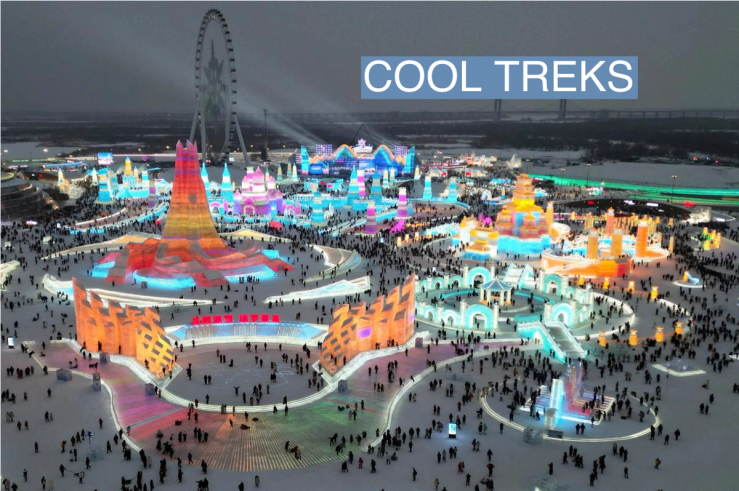The News
China’s 1.4 billion people are getting ready for the busiest travel season of the year as Lunar New Year approaches. Celebrations officially begin on Feb. 10, but the 40-day travel period surrounding the Spring Festival kicks off on Friday. Analysts and government officials are predicting it will be China’s busiest domestic travel event ever.
But Beijing’s shaky economy means that tourists’ travel habits are vastly different from what they were a few years ago. New destinations are emerging as must-visit hotspots, and Chinese social media influencers are recommending sustainable approaches to celebrating the holidays.
SIGNALS
Affordability and social media trends are driving regional tourism
The northern Chinese city of Harbin in Heilongjiang province has become an unlikely tourism hotspot this holiday season. The city — known for its annual ice sculpture festival and proximity to several ski resorts — received over 30 million visitors and $841 million in revenue over the New Year weekend, while the entire province generated just $247 million this time last year, according to the financial news site Caixin. Chinese tourists previously favored international travel within Asia during the Jan.1 holidays, but in a poor economy, “inexpensive cities that offer a strong sense of local culture and hospitality” have become new favorites, Caixin reported.
Harbin locals started using the hashtag “little southern potatoes” to refer to the influx of southern tourists. But the term quickly evolved into a meme that has increasingly placed Harbin on tourists’ radars, according to Chinese digital culture site Radii. Local businesses are capitalizing on the internet buzz, with vendors and restaurants eager to promote their affordable, local snacks (a lot of frozen fruit), as well as souvenirs on sites like Weibo and Xiaohongshu.
Hong Kong re-emerges as a mainland tourist destination, but locals aren’t happy
Tourism from China to Hong Kong began plummeting in 2019 as the city was consumed by civil unrest and subsequently the COVID-19 pandemic. But with cruise ship vacations becoming an increasingly popular holiday travel option, the port city has been experiencing “explosive growth” in mainland tourism, state media Beijing News reported. But many locals are not happy with the influx of mainland visitors, who have “revived old tensions in a city transformed by Beijing’s political crackdown,” the New York Times wrote. In addition to crowding Hong Kong streets, budget travel groups are avoiding Hong Kong’s high-end shopping, restaurants, and nightlife, hampering what was a key backbone of its thriving tourism industry. Even pro-Beijing lawmakers in Hong Kong are voicing frustration over the lack of “good quality tour groups,” the Times reported.
Potential record-breaking car travel sparks debate over fireworks ban to ease pollution
Chinese authorities are projecting that 9 billion trips will take place over the 40-day Lunar New Year travel season within China, the 21st Century Business Herald reported, which would mark a new record. That also means car trips, in particular, will break new records. Officials predict an average of 37.2 million additional vehicles will flood the roads each day during this period, despite the popularity of China’s extensive high-speed rail network. To offset some of the carbon emissions, electric vehicle manufacturers like Nio are offering customers online store benefits if they share battery packs with other EV drivers traveling at the same time, according to China EV news site CnEVPost.
As Chinese environmental groups have become more vocal about CO2 emissions in recent years, local governments have implemented new solutions to address air pollution, including bans and restrictions on fireworks during Lunar New Year, a symbolic staple of the holiday. But Beijing recently overruled some cities’ bans on pyrotechnics, sparking fiery debate on Chinese social media about balancing tradition with sustainability during Lunar New Year. Many influencers are pushing for the use of electric firecrackers, but these alternatives have not yet “stood the test of time:” The public views them as “self-deception” that takes away from the spirit of the holiday, Chinese tech and business site 36kr reported last year.



